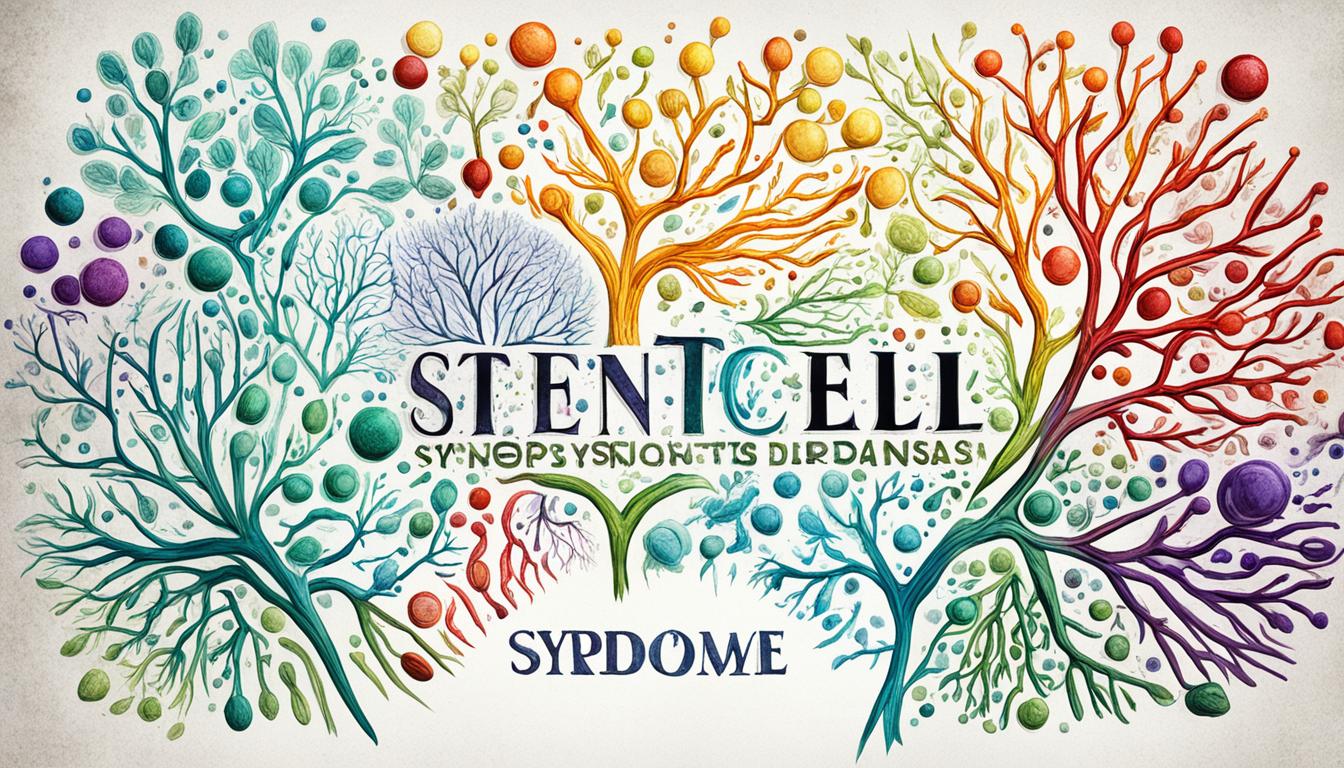Hunt’s syndrome, also known as Ramsay Hunt syndrome or herpes zoster oticus, is a rare issue. It happens later after having chickenpox, caused by the varicella-zoster virus. This syndrome causes facial paralysis on one side, along with ear pain and small blisters near the ear and in the ear canal. These symptoms form a triad that doctors look for to diagnose Ramsay Hunt syndrome.
The disease is hard to spot early, which means its treatment can be delayed. This delay sometimes leads to bad effects that last a long time. Helping people get better includes trying to shorten how long they’re sick, easing their pain, and stopping the long-term effects. In recent times, using stem cells to help with Hunt’s syndrome has become an option, giving patients new hope.
Key Takeaways:
- Hunt’s syndrome, also known as Ramsay Hunt syndrome or herpes zoster oticus, is a complication of varicella-zoster virus infection.
- Symptoms of Hunt’s syndrome include facial paralysis, ear pain, and vesicles near the ear.
- Ramsay Hunt syndrome is often misdiagnosed or delayed, leading to potential long-term complications.
- Treatment focuses on reducing illness duration, providing pain relief, and preventing complications.
- Stem cell therapy is a promising treatment option for Hunt’s syndrome.
Etiology, Risk Factors, and Pathophysiology of Hunt’s Syndrome
Hunt’s syndrome is also known as Ramsay Hunt syndrome or herpes zoster oticus. It’s caused by the reactivation of the varicella-zoster virus. This virus is part of the human herpesvirus family and can stay dormant in your body for years.
When someone’s immune system is weak or they’re really stressed, the virus can become active again. This affects the geniculate ganglion, where the facial nerve (cranial nerve VII) is located.
You may notice several symptoms when the virus reactivates. These include facial paralysis, ear pain, and a rash near the ear. Because the facial nerve is close to the nerve for hearing and balance, people might also face hearing problems and dizziness.
People who have weak immune systems or haven’t gotten the varicella vaccine are at a higher risk of getting Hunt’s syndrome. A weak immune system can’t fight off the virus as well.
Knowing the causes and risks for Hunt’s syndrome is very important. It helps healthcare workers to spot the condition early and treat it properly. With the right care, the problems caused by Hunt’s syndrome can be less severe.
Risk Factors for Hunt’s Syndrome
| Risk Factors | Description |
|---|---|
| Immunocompromised | Individuals with weakened immune systems, such as those with HIV/AIDS or undergoing immunosuppressive therapy. |
| Physiological Stress | High levels of stress, both physical and emotional, can trigger viral reactivation. |
| No Varicella Vaccination | Individuals who have not received the varicella vaccine are more susceptible to varicella-zoster virus reactivation. |
In short, Hunt’s syndrome happens when the varicella-zoster virus wakes up. It mainly affects the geniculate ganglion and cranial nerves we’ve discussed. Patients show a common set of symptoms, including hearing loss and dizziness. Understanding this disease deeply is key to helping those who get it.
Diagnosis, Management, and Prognosis of Hunt’s Syndrome
Hunt’s syndrome is diagnosed by its three main symptoms: facial paralysis, ear pain, and vesicles. Doctors might also run tests on fluid from the vesicles to confirm the varicella-zoster virus. These tests help choose the best treatments.
Early diagnosis is key to managing Hunt’s syndrome well. Starting treatment with steroids and antivirals quickly can lead to better outcomes. Steroids lower inflammation and safeguard nerves, while antivirals fight the virus. The House-Brackmann scale shows how much facial nerve damage has happened. It helps doctors adjust treatment and check progress.
Most people with Hunt’s syndrome get better and their face works as normal. But, some might face challenges like synkinesis, where muscles move at the wrong time. Others might feel pain that doesn’t go away, even after the sickness ends. How well someone recovers can depend on the disease’s severity and if treatment was started without delay. Yet, with the right care and quick action, many fully recover.
Doctors are always looking for new ways to treat Hunt’s syndrome. Stem cell therapy is a promising new treatment. It tries to heal nerve damage. Studies are looking at how well this method works and if it’s safe. This gives hope to those with Hunt’s syndrome.

